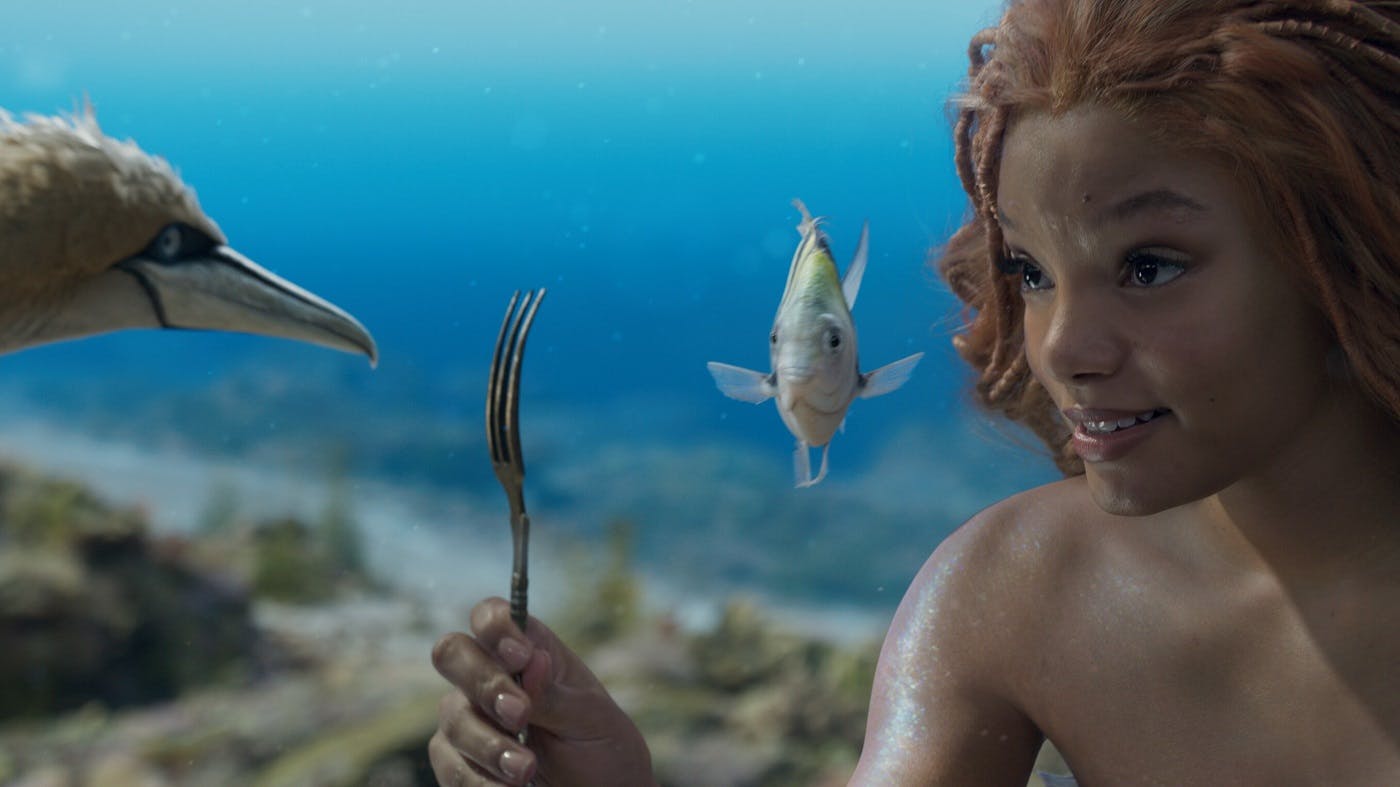Alan Menken and Howard Ashman‘s Little Mermaid music is as powerful in 2023 as it was in 1989, a quality that fuels much of the remake’s appeal. Blessed with excellent casting for Ariel (Halle Bailey), the new The Little Mermaid sounds as good as the original.
Otherwise, though, it struggles with familiar problems for a live-action Disney remake: Clunky CGI, an overinflated runtime, and an underlying aura of soulless corporate IP. The most demoralizing aspect is the fact that director Rob Marshall (Chicago) has seemingly forgotten how to film a movie musical.
Director: Rob Marshall
Release: Theatrical
Adding 50 minutes of new material to the 1989 Disney classic, this live-action remake still feels like a pale imitation, exchanging stylish animation for uncanny CGI and poorly-shot musical numbers.
Bailey brings fantastic vocals and an engaging, wide-eyed charm to Ariel, starring in a classic fairytale about a mermaid who yearns to explore the human world. After falling for the dreamy human prince Eric (Jonah Hauer-King) during a shipwreck, she makes a perilous deal with the sea witch Ursula (Melissa McCarthy): In exchange for Ariel’s magical voice, Ursula will transform Ariel into a human for three days, allowing her to visit dry land. But if Ariel fails to kiss Eric during that time, she’ll be Ursula’s prisoner forever.
The 1989 original kickstarted the Disney Renaissance, bringing a Broadway musical sensibility to the studio’s animated films. At 83 minutes long, it’s funny, romantic, and packed with iconic songs. Clocking in at 135 minutes, the live-action version is almost an hour longer—and not for good reason.
While it makes sense to give Eric and Ariel more time to build their relationship, most of the other additions feel pointless: CGI-heavy action scenes, new songs by Lin Manuel Miranda, etc. There’s a pressing sense that Disney is trying to justify the remake’s existence by improving stuff that doesn’t need to be improved—the most controversial example being lyrical updates that supposedly make the songs more feminist. (They don’t.) Meanwhile, the extended runtime and blockbuster action make it unsuitable for little kids; a weird form of self-sabotage, given that this clearly isn’t a film for grownups.

Like all of Disney’s live-action remakes, The Little Mermaid both invites and suffers from comparisons to its predecessor. Fuelled by nostalgia, it recreates numerous familiar scenes and beloved songs—all of which feel like pale imitations, particularly on a visual level.
Concerns about murky lighting and bland CGI were already a talking point when the trailers came out, but in the end, that isn’t a notable problem. On a big screen, The Little Mermaid isn’t unusually dark or low-contrast. No, the real issue is the lack of synergy between the vocal performances (which are mostly great) and what’s happening onscreen. And this doesn’t just count for the songs—it’s a defining flaw for the CG animal characters too.
Ariel’s friends Scuttle the gannet (Awkwafina), Flounder the fish (Jacob Tremblay), and Sebastian the crab (Daveed Diggs) combine characterful voice-acting with lifeless visual design. While old-fashioned animation presented them as stylized, emotive characters, their “live-action” counterparts are totally inexpressive. It’s both weird and ineffective to hear Awkwafina deliver quirky comedy dialogue through the rigid beak of a photorealistic bird.
Arriving a few months after the glorious visual spectacle of Avatar: The Way of Water, The Little Mermaid’s underwater scenes are undeniably awkward by comparison. The mermaids’ body language doesn’t feel entirely natural, and their floating hair is distractingly uncanny. This combination of live-action acting and underwater effects is always tricky, and here the issues are more grating because the animated film looks so much more distinctive and fun. During the musical numbers, this becomes a glaring flaw.
Echoing previous remakes like Beauty and the Beast, this film struggles to translate its most famous musical scenes. “Under the Sea”—a kaleidoscope of simple, expressive hand-drawn animation—becomes confusing and overcomplicated when recreated with creepily realistic fish. Ursula’s “Poor Unfortunate Souls” is a visual mess, contrasting Melissa McCarthy’s powerful vocals with camerawork that lurches around a gloomy cave, failing to frame her face or body with any kind of impact. Offering little connection between sight and sound, the remake repeatedly replaces clean, lively visual setpieces for forgettable montages.
It’s a morbidly fascinating problem in the context of Rob Marshall’s pedigree as a musical director, winning Best Picture for the old-school song-and-dance hit Chicago in 2003. Despite Halle Bailey’s charisma and vocal talent, The Little Mermaid really isn’t treating her like a musical star. Some scenes include dancing, yet fail to offer cinematic choreography. Others just film songs like a regular dramatic scene. You might as well just listen to the cast album.
The Little Mermaid’s sweet-hearted story and beloved music are enough to break through these issues on occasion, but that’s damning with faint praise. The films of the Disney Renaissance flourished because they combined world-class animation with a Broadway musical sensibility. If the people in charge of these remakes had any sense, they’d be taking cues from contemporary Bollywood and the classic American musicals of the mid-20th century. Films with real visual flair, showcasing a range of talent.
Right now though, there’s no sign that anyone at Disney really cares about these remakes being good. Their purpose is to shore up the studio’s IP, and as long as people keep buying tickets, they’re deemed a success.



